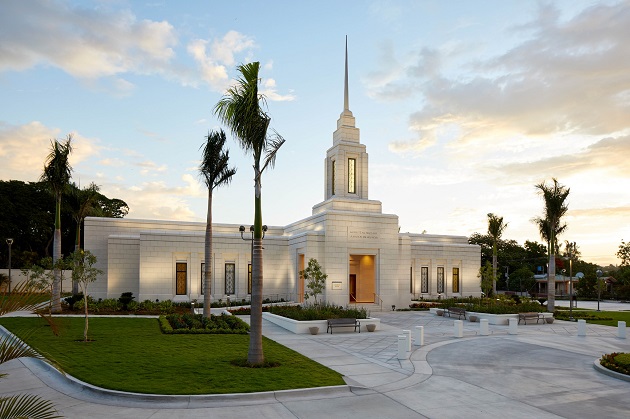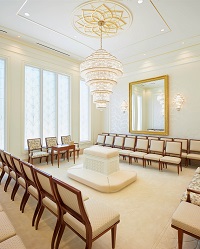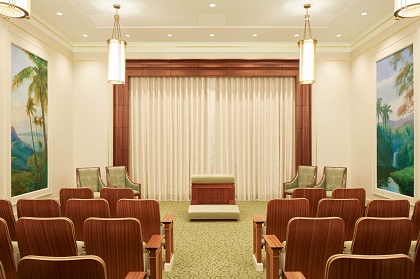4 reasons why projects like the new luxurious temple built by the Mormons in Haiti are unhelpful.
 The new temple of the The Church of Jesus Christ of Later-day Saints Port-au-Prince, Haiti. / Photo: LDS Media Library
The new temple of the The Church of Jesus Christ of Later-day Saints Port-au-Prince, Haiti. / Photo: LDS Media Library
The Church of Jesus Christ of Later-day Saints (better known as Mormons) have just opened their first temple in Haiti. An architectural structure that draws the attention of many because of the luxury with which it has been built.
The Caribbean country is the poorest in the whole American continent with an income per capita of approximately 4 € per day, according to World Bank figures. Haiti occupies the 168th place of the Human Development Index of the United Nations.
 Photo: LDS Media Library
Photo: LDS Media LibraryBut even there Babel towers are raised. The complex of more than 3,000 square meters is full of materials that are impossible to obtain in Haiti like Swarovski crystal and Venetian glass. The temple was finished in barely 18 months in a country where the great majority of buildings seem to be in a never ending phase of construction.
What we have seen with Mormon temples can happen to some degree with evangelical churches as well. Church buildings are built in developing countries, often backed by a prosperity gospel theology that has grown its roots in some of the poorest countries. At times, the issue could be just a matter of lack of tact of Western Christian missionary organisations – as they build structures that could be normal in their country of origin, but are seen as mansions in these cultural contexts.
 Photo: LDS Media Library
Photo: LDS Media LibraryWhat effect can the image of a rich church have in countries like Haiti? Why should both local evangelicals and missionary agencies avoid this luxury façade by all means? Here are some reasons:
1. Separation from the local community. In the last two centuries, many Protestant missionaries established their community or missionary “station” in the margins of the local community. When someone converted to Christianity, he would join the missionaries - just as a fish is dragged with the fishing line. This might have attracted many, but separated these new believers from their own community.
This effect differentiation with the local community happens also when a two-floor church building with a marble floor is built in a village where most people live in shacks. Or when the church has water and electricity but no initiative has been started to provide for other people in the neighbourhood. Wherever a local community is strong, planting a church that is too different and separated from the normal life is not a good idea, even if the church leaders are locals themselves.
2. Corruption. The corruption of the political system and of those in authority is, many times, the great scourge of developing countries. The streets of Haiti have seen in the last months many demonstrations and barricades of people fed up with a serious corruption scandal that implicates the President. It is the same old story. When the local community, and especially those who are non-believers, see a church and their leaders surrounded by luxury, they will probably ponder two options: either the ‘whites’ are again paying a house for the black pastor, or… it is the same old story.
3. Syncretism. The mixing native traditions and spiritual practices with Christianity is a worrying reality that happens often in countries like Haiti. But there are other types of syncretism that we often ignore. For example, the syncretism of the ‘god of money’ with our own Western Christian culture. As we get involved in building Christian church buildings like ours elsewhere, we risk adapting their faith practice to our own Western culture – and this in turn brings us back to reason number 1.
4. Neoliberal ‘blessing’. The development of a society or community can be understood essentially from two prisms: Neoliberal theory or Post-development theory. The first one trusts the economy to be the main motor of development. The seconds defends that there are many other elements beyond economy, which define the concept of progress and development, and these vary depending on the culture.
Brought to the Christian context, we could translate “development” for “blessing”. Building a church building that is too prosperous in the eyes of the local community is choosing the theory of the neoliberal ‘blessing’, even when this is done unintentionally. It communicates the message that the degree of blessing received from God is measured in wealth. Nothing further from the truth: we know that God’s kingdom is not built through the accumulation of treasures on earth.
What countries like Haiti need is not temples with glass lamps and granite columns, and not even big sounds systems and last generation audio visual equipment. Like everyone else, people who have not met Jesus yet need to see God’s love put into practice. If churches have to abound in something, it is in the unconditional love that goes beyond cultures and socio-economic conditions.
Pau Abad is communications manager of Gain Spain, a Christian NGO working in Haiti.

Las opiniones vertidas por nuestros colaboradores se realizan a nivel personal, pudiendo coincidir o no con la postura de la dirección de Protestante Digital.
Si quieres comentar o